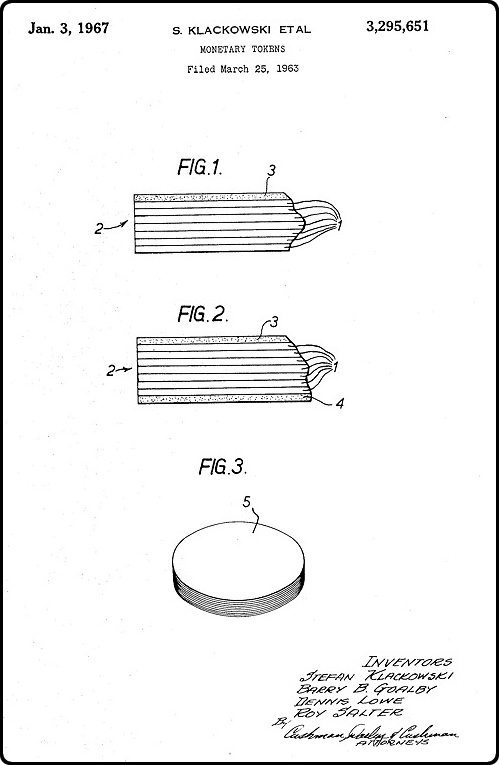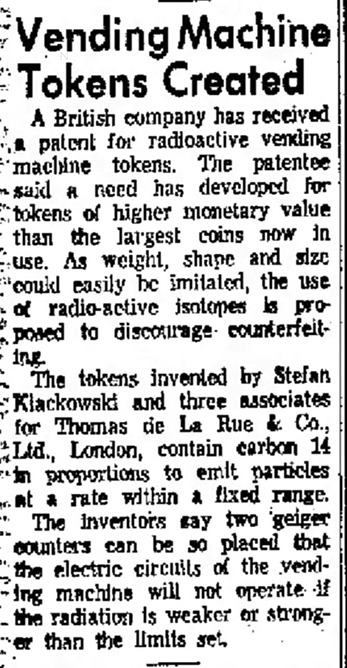Radioactive Vending Machine Tokens
Sometimes vendors would like to sell relatively high-value items in vending machines. That is, merchandise worth more than a candy bar. Nowadays that's not a problem because there's technology that can scan paper currency or read credit cards, making larger transactions possible.
But back in the 1960s, vending machines relied on coins for payment, so selling high-value merchandise wasn't practical. Especially since the machines could only measure weight, shape, and size to determine if the coins were real — and these characteristics are easy to fake with low-value blanks.
The British printing company Thomas de la Rue devised a solution: radioactive vending machine tokens.
Its researchers realized it would be possible to create tokens made out of layers of radioactive materials such as uranium and carbon14. These tokens would emit unique radioactive signatures that could be measured by Geiger counters inside a vending machine. Such tokens wouldn't be easy to forge. The company patented this idea in 1967.
I'm not aware that any vending machines accepting radioactive tokens were ever put into to use.
I imagine they would have suffered from the same problem that plagued other efforts to put radiation to practical, everyday use — such as the radioactive golf balls we posted about a few months ago (the radiation made it possible to find the balls if lost). The radiation from one token (or golf ball) wasn't a health hazard, but if a bunch of them were stored together, then the radiation did become a problem.


But back in the 1960s, vending machines relied on coins for payment, so selling high-value merchandise wasn't practical. Especially since the machines could only measure weight, shape, and size to determine if the coins were real — and these characteristics are easy to fake with low-value blanks.
The British printing company Thomas de la Rue devised a solution: radioactive vending machine tokens.
Its researchers realized it would be possible to create tokens made out of layers of radioactive materials such as uranium and carbon14. These tokens would emit unique radioactive signatures that could be measured by Geiger counters inside a vending machine. Such tokens wouldn't be easy to forge. The company patented this idea in 1967.
I'm not aware that any vending machines accepting radioactive tokens were ever put into to use.
I imagine they would have suffered from the same problem that plagued other efforts to put radiation to practical, everyday use — such as the radioactive golf balls we posted about a few months ago (the radiation made it possible to find the balls if lost). The radiation from one token (or golf ball) wasn't a health hazard, but if a bunch of them were stored together, then the radiation did become a problem.


Nashua Telegraph - Jan 11, 1967
Comments
A truck full of bananas will set off radiation detectors.
Posted by Techs on 03/08/20 at 07:59 AM
In practical terms, it would be to the benefit of governments if the currency consisted exclusively of coinage and that coinage were radioactive.
For example, in terms of taxation it would not be possible to accumulate vast amounts of coinage and hide it. Tax revenue officers could find the hoard with a Geiger counter easily. Another telltale would be the lack of hair and general lethargy due to the accumulated exposure. This would also benefit the economy because radiation exposure would tend to encourage more spending in order to get rid of the threat of slow, lingering death.
For example, in terms of taxation it would not be possible to accumulate vast amounts of coinage and hide it. Tax revenue officers could find the hoard with a Geiger counter easily. Another telltale would be the lack of hair and general lethargy due to the accumulated exposure. This would also benefit the economy because radiation exposure would tend to encourage more spending in order to get rid of the threat of slow, lingering death.
Posted by KDP on 03/08/20 at 09:27 AM
@KDP -- Accumulation of coinage would be problematic, but could be overcome.
Back in the 1960s, I was on the periphery of work being done on a farmstead (kid perched on the back of dad's water truck, ready to open or close the valve on command). In the dim, distant past, a well had been capped for some reason and a new one drilled near it. When they opened it, they found a rope/cable suspended inside.
Small bags had been tied to it at intervals (this was probably a 4" well, certainly no bigger than 6"). Each bag held a couple of coins. They were mostly silver dollars, but there was some $1, $5, and $20 gold coins (memorable because it was the first time I'd ever seen anything other than a $20). A few bags, towards the bottom, had rotted somewhat and were empty, and there was some discussion whether the rope/cable might have rotted/broken off.
I don't know if anyone ever tried to retrieve what might have fallen to the bottom. Getting something out of a 4" hole more than a hundred feet down would certainly be an interesting problem. Doing it in a cost-effective manner would be quite the challenge.
Getting back to your scenario: drill a well, put the coins in plastic tubes, attach them to a poly rod, and drop it in so they're below the water level. You could accumulate a significant amount which couldn't be reasonably detected.
On a completely different course: I once read that disposing of a significant amount nuclear waste could be accomplished by packaging it in the same manner as manuscripts and sending them to editors with a cover letter explaining they're stream-of-consciousness novels dealing with basic humanity and awakening love during a rainy Sunday afternoon (I paraphrase due to misremembering the original). Editors supposedly supported the idea because they're rather be exposed to deadly radiation than another one of those novels.
Back in the 1960s, I was on the periphery of work being done on a farmstead (kid perched on the back of dad's water truck, ready to open or close the valve on command). In the dim, distant past, a well had been capped for some reason and a new one drilled near it. When they opened it, they found a rope/cable suspended inside.
Small bags had been tied to it at intervals (this was probably a 4" well, certainly no bigger than 6"). Each bag held a couple of coins. They were mostly silver dollars, but there was some $1, $5, and $20 gold coins (memorable because it was the first time I'd ever seen anything other than a $20). A few bags, towards the bottom, had rotted somewhat and were empty, and there was some discussion whether the rope/cable might have rotted/broken off.
I don't know if anyone ever tried to retrieve what might have fallen to the bottom. Getting something out of a 4" hole more than a hundred feet down would certainly be an interesting problem. Doing it in a cost-effective manner would be quite the challenge.
Getting back to your scenario: drill a well, put the coins in plastic tubes, attach them to a poly rod, and drop it in so they're below the water level. You could accumulate a significant amount which couldn't be reasonably detected.
On a completely different course: I once read that disposing of a significant amount nuclear waste could be accomplished by packaging it in the same manner as manuscripts and sending them to editors with a cover letter explaining they're stream-of-consciousness novels dealing with basic humanity and awakening love during a rainy Sunday afternoon (I paraphrase due to misremembering the original). Editors supposedly supported the idea because they're rather be exposed to deadly radiation than another one of those novels.
Posted by Phideaux on 03/08/20 at 03:10 PM
Commenting is not available in this channel entry.



Category: Inventions | Patents | Atomic Power and Other Nuclear Matters | 1960s